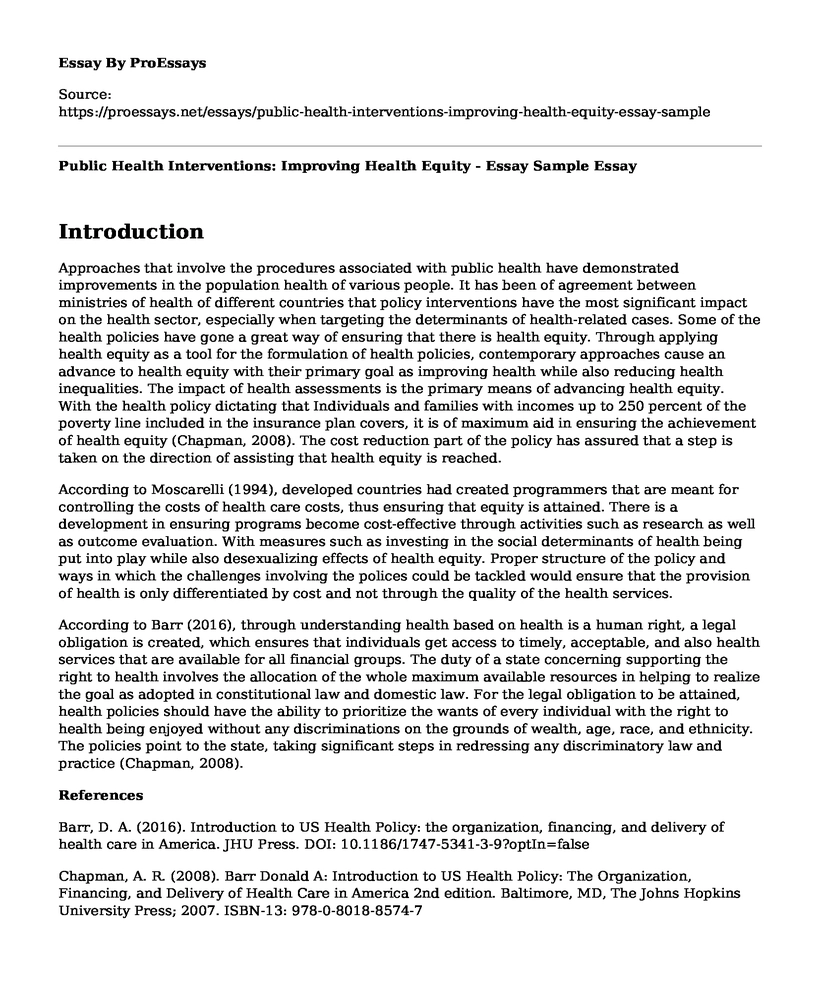Introduction
Approaches that involve the procedures associated with public health have demonstrated improvements in the population health of various people. It has been of agreement between ministries of health of different countries that policy interventions have the most significant impact on the health sector, especially when targeting the determinants of health-related cases. Some of the health policies have gone a great way of ensuring that there is health equity. Through applying health equity as a tool for the formulation of health policies, contemporary approaches cause an advance to health equity with their primary goal as improving health while also reducing health inequalities. The impact of health assessments is the primary means of advancing health equity. With the health policy dictating that Individuals and families with incomes up to 250 percent of the poverty line included in the insurance plan covers, it is of maximum aid in ensuring the achievement of health equity (Chapman, 2008). The cost reduction part of the policy has assured that a step is taken on the direction of assisting that health equity is reached.
According to Moscarelli (1994), developed countries had created programmers that are meant for controlling the costs of health care costs, thus ensuring that equity is attained. There is a development in ensuring programs become cost-effective through activities such as research as well as outcome evaluation. With measures such as investing in the social determinants of health being put into play while also desexualizing effects of health equity. Proper structure of the policy and ways in which the challenges involving the polices could be tackled would ensure that the provision of health is only differentiated by cost and not through the quality of the health services.
According to Barr (2016), through understanding health based on health is a human right, a legal obligation is created, which ensures that individuals get access to timely, acceptable, and also health services that are available for all financial groups. The duty of a state concerning supporting the right to health involves the allocation of the whole maximum available resources in helping to realize the goal as adopted in constitutional law and domestic law. For the legal obligation to be attained, health policies should have the ability to prioritize the wants of every individual with the right to health being enjoyed without any discriminations on the grounds of wealth, age, race, and ethnicity. The policies point to the state, taking significant steps in redressing any discriminatory law and practice (Chapman, 2008).
References
Barr, D. A. (2016). Introduction to US Health Policy: the organization, financing, and delivery of health care in America. JHU Press. DOI: 10.1186/1747-5341-3-9?optIn=false
Chapman, A. R. (2008). Barr Donald A: Introduction to US Health Policy: The Organization, Financing, and Delivery of Health Care in America 2nd edition. Baltimore, MD, The Johns Hopkins University Press; 2007. ISBN-13: 978-0-8018-8574-7
Moscarelli, M. (1994). Health and economic evaluation in schizophrenia: implications for health policies. Acta Psychiatrica Scandinavica, 89, 84-88. DOI: 10.1111/j.1600-0447.1994.tb05872.x
Cite this page
Public Health Interventions: Improving Health Equity - Essay Sample. (2023, May 05). Retrieved from https://proessays.net/essays/public-health-interventions-improving-health-equity-essay-sample
If you are the original author of this essay and no longer wish to have it published on the ProEssays website, please click below to request its removal:
- Genetic Disease - Case Study Example
- Case Study: Susan Summers and Cushing Syndrome
- Current Public and Administrative Policies in Colleges
- Diagnosis, Treatment and Complication of Deep Carious Lesions and Pulp Exposure
- Essay Sample on Military Healthcare Practitioners' Dual Loyalty Dilemma: Confidentiality & Ethics
- Family Struggles: Examining Socioeconomic Impact of Cancer - Essay Sample
- Morality & Abortion: An Ethical Dilemma - Essay Sample







